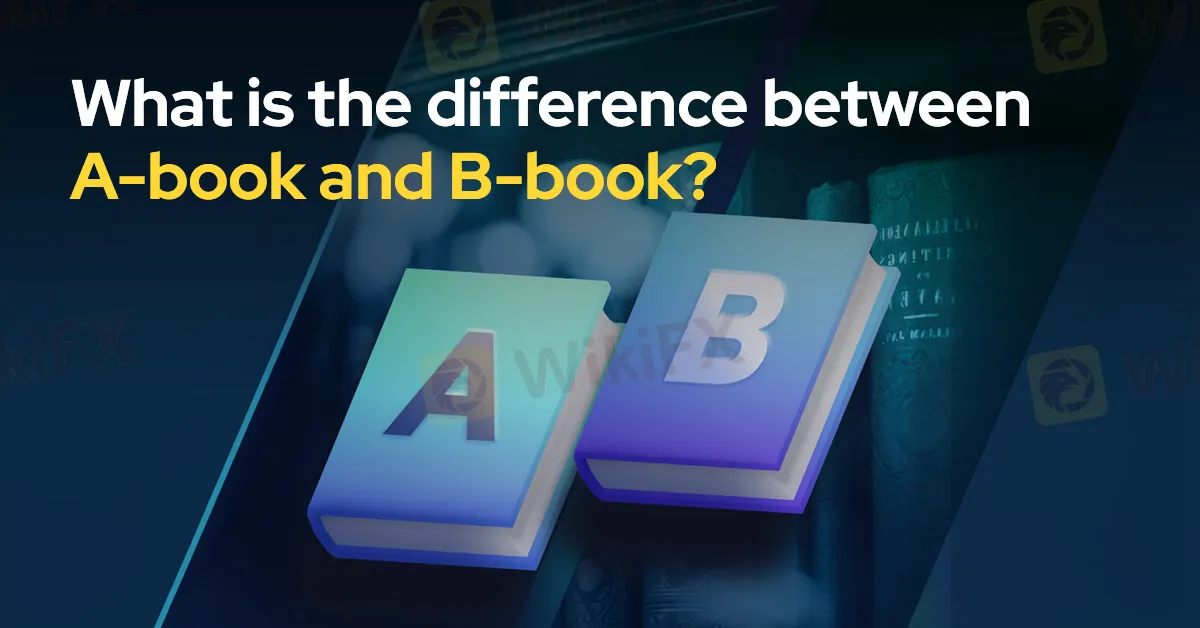简体中文
繁體中文
English
Pусский
日本語
ภาษาไทย
Tiếng Việt
Bahasa Indonesia
Español
हिन्दी
Filippiiniläinen
Français
Deutsch
Português
Türkçe
한국어
العربية
What is the difference between A-book and B-book?
Abstract:Brokers are often classified into two categories: A-book and B-book brokers. Understanding these distinctions can help traders choose the right broker for their trading needs. In this article, we’ll delve into what A-book and B-book brokers are, how they operate, and the key differences between them.

Brokers are often classified into two categories: A-book and B-book brokers. Understanding these distinctions can help traders choose the right broker for their trading needs. In this article, well delve into what A-book and B-book brokers are, how they operate, and the key differences between them.
What Are A-book and B-book Brokers?
To grasp the concept of A-book and B-book brokers, we need to understand the fundamental distinction between them. These terms refer to how brokers handle their clients' trades and manage risk. Importantly, there are no brokers exclusively classified as A-book or B-book; instead, brokers might use one or both models depending on the situation.
A-book Forex Brokers
A-book brokers, often referred to as STP (Straight Through Processing) brokers, are known for passing their clients orders to the interbank market or other external execution venues. They act as intermediaries, sourcing liquidity and facilitating trades between their clients and the broader financial markets.
Characteristics of A-book Brokers:
Direct Market Access: Clients' orders are routed directly to the interbank market, where they are executed at prevailing market prices.
Transparency: Pricing and execution are generally more transparent since orders are fulfilled in the open market.
No Conflict of Interest: Since A-book brokers pass orders to external venues, they do not take opposing positions to their clients trades.
B-book Forex Brokers
B-book brokers, also known as market makers, operate differently. They internalize their clients‘ trades, meaning that orders are fulfilled by the broker’s own dealing desk rather than being passed on to external markets.
Characteristics of B-book Brokers:
Internal Order Fulfillment: Trades are executed internally, often by taking the opposite side of clients trades.
Market Making: The broker sets the bid and ask prices and may benefit when clients lose money, as their losses can directly contribute to the brokers profits.
Client Segmentation: Typically, B-book brokers may place less profitable traders into the B-book system, while more profitable traders might be handled through the A-book system.
Key Differences
The primary difference between A-book and B-book forex brokers lies in their order fulfillment processes:
A-book Brokers: Orders are executed in the interbank market or other external venues. Clients benefit from direct market access with potentially better transparency and pricing.
B-book Brokers: Orders are fulfilled internally by the brokers dealing desk. This can create a conflict of interest, as the broker may profit from clients' losses.
Conclusion
Choosing between an A-book and a B-book broker depends on your trading preferences and goals. A-book brokers offer transparency and direct access to the interbank market, while B-book brokers may provide more favorable conditions for certain types of traders but could have inherent conflicts of interest. Understanding these models can help you make an informed decision and select a broker that aligns with your trading strategy.

Disclaimer:
The views in this article only represent the author's personal views, and do not constitute investment advice on this platform. This platform does not guarantee the accuracy, completeness and timeliness of the information in the article, and will not be liable for any loss caused by the use of or reliance on the information in the article.
Read more

Bank Negara Malaysia Flags 12 New Companies for Unauthorised Activity
Bank Negara Malaysia (BNM) has updated its Financial Consumer Alert List (FCA List) by adding 12 more entities, reinforcing its efforts to warn the public against unregulated financial schemes. Check if your broker made the list!

TradingView Brings Live Market Charts to Telegram Users with New Mini App
TradingView has launched a mini app on Telegram, making it easier for users to track market trends, check price movements, and share charts.

March Oil Production Declines: How Is the Market Reacting?
Oil production cuts in March are reshaping the market. Traders are closely watching OPEC+ decisions and supply disruptions, which could impact prices and future production strategies.

How to Calculate Leverage and Margin in the Forex Market
Leverage amplifies both potential profits and risks. Understanding how to calculate leverage and margin helps traders manage risks and avoid forced liquidation.
WikiFX Broker
Latest News
Exposing the Top 5 Scam Brokers of March 2025: A Closer Look by WikiFX
Gold Prices Climb Again – Have Investors Seized the Opportunity?
Webull Launches SMSF Investment Platform with Zero Fees
Australian Regulator Warns of Money Laundering and Fraud Risks in Crypto ATMs
The Withdrawal Trap: How Scam Brokers Lure Victims into Paying More
FCA to Investors: Think Twice Before Trusting These Brokers
Trump\s tariffs: How could they affect the UK and your money
Trump gambles it all on global tariffs he\s wanted for decades
TradingView Brings Live Market Charts to Telegram Users with New Mini App
Trump tariffs: How will India navigate a world on the brink of a trade war?
Currency Calculator







